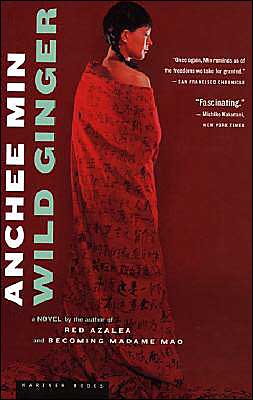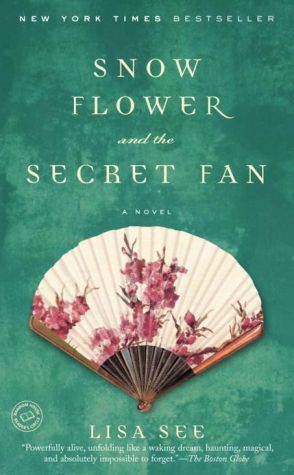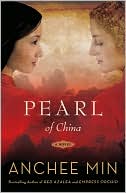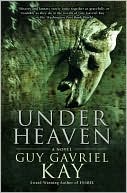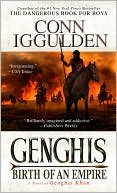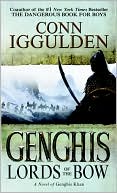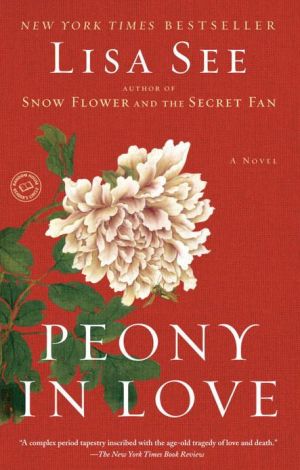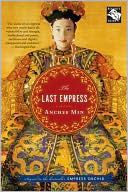Wild Ginger: A Novel
At once a coming-of-age tale and a heart-rending love story, Wild Ginger explores the devastating experience of the Cultural Revolution, which defined Anchee Min’s youth. The beautiful, iron-willed Wild Ginger is only in elementary school when she is singled out by the Red Guards for her “foreign-colored eyes.” Her classmate Maple is also a target of persecution. The novel chronicles the two girls’ maturing in Shanghai in the late 1960s and early 1970s, when Chairman Mao ruled absolutely and...
Search in google:
At once a coming-of-age tale and a heart-rending love story, Wild Ginger explores the devastating experience of the Cultural Revolution, which defined Anchee Min’s youth. The beautiful, iron-willed Wild Ginger is only in elementary school when she is singled out by the Red Guards for her “foreign-colored eyes.” Her classmate Maple is also a target of persecution. The novel chronicles the two girls’ maturing in Shanghai in the late 1960s and early 1970s, when Chairman Mao ruled absolutely and his followers took up arms in his name. Wild Ginger grows up to become a model Maoist, but her love for a man soon places her in an untenable position — and ultimately in mortal danger. This slim and powerful novel “examines the fragile sensibilities and emotions of an entire generation of Chinese youth” (Washington Post) and brilliantly delineates the psychological and sexual perversion of those times.Book MagazineSet during the Cultural Revolution in China, this theatrical novel is both a tragic love story and a parable that illustrates the corruption caused by political and moral fanaticism. After saving a young female fishmonger from a ruthless crook, Wild Ginger, a fourteen-year-old orphan, is honored by Chairman Mao Tse-tung, who appoints her the commander-in-chief of the Red Guard, a position that requires her to become "the people's servant." When she falls in love with a fellow revolutionary, she is forced to choose between herself and her political ideology. Wild Ginger revisits the themes of Min's bestselling novel Becoming Madame Mao. Its plot is as formulaic as an opera, and its tragic heroine's fate is melodramatic. What redeems this book is its narrator, Maple, the confidante of Wild Ginger. Ultimately, it is Maple's insight and touching devotion to her friend that steal the show. —Susan Tekulve
1 In my memory she has a pair of foreign-colored eyes, the pupils yellow with a hint of green. They reminded me of a wildcat. She stood by the classroom door, her face in shadow. Behind her the sun looked like a giant red lantern. As the sun rose, suddenly the light spilled out. The beam hit the windows, bounced, and was reflected in her eyes. It was there, in her eyes, that I saw water in motion, the bottom of a pond clearly illuminated by the light. The water weeds swayed gracefully like ancient long-sleeve dancers.\ \ I remember my thought: she's not Chinese. Then I thought no, it's impossible. It must be the sunlight playing tricks on me. She was just like me, a girl with thick short braids at the side of her ears. She was in a blue Mao jacket. Her right hand held an abacus.\ She wore an old pair of army shoes with her big toes on their way out. No Red Guard armband on her left arm. I remember my fear from that instant. It was what connected us — a sign of political uncertainty. I thought of Hot Pepper, the bully girl, the head of the Red Guard. She would definitely suspect that the newcomer was a reactionary.\ I remember I began to feel sorry for the newcomer. The same way I felt for myself. I was rejected for membership in the Red Guard because I was not from a three-generation-of-labor family. My parents and grandparents were teachers. It didn't matter that we were just as poor. We lived in a converted garage in Shanghai. Eight people in one room.\ \ Hot Pepper believed in violence. Hitting was part of her treatment. She said that she had to "pump" the "dirty bourgeois blood" out of me. The authorities and society encouraged her. People of my category wereconsidered to have "reactionary dust" in our thoughts. It was Mao's teaching that "the dust won't go away unless there is a broom." Hot Pepper called herself a "revolutionary broom." \ Hot Pepper had a pair of mice eyes and an otterlike body. No neck. Her bangs were so long that her eyes looked as if they were behind bars. She wore a Red Guard armband and an extra-large green military uniform. She was very proud of her uniform because it had four pockets. Pockets were an indication of rank — the more pockets, the higher the rank. The uniform was from her uncle, who had served in the People's Liberation Army. Hot Pepper also wore two palm-size ceramic Mao buttons, which were pinned on each side of her chest. The buttons were peach-colored morning sky with a tiny Mao head in the middle. From a distance they looked like two breasts with Mao heads as nipples.\ \ Every morning Hot Pepper led a team to block the school gate.\ They were there to examine everyone's loyalty toward Chairman Mao.\ The school's requirement was that everyone bring the "three-piece treasure": a Mao button, a Little Red Book (Mao quotations), and, if you were a Red Guard, an armband. If you forgot, Hot Pepper lined you up and held you until the bell rang. Sometimes Hot Pepper picked people at random to quiz them on Mao quotations. She would say the page number and the person was expected to recite the quotation. If the person made a mistake, Hot Pepper would decide on a form of punishment. She would either order him to stand by the gate and read the quotation aloud one hundred times until he was able to recite it, or she would order him to clean the school's restrooms for a week.\ \ Every morning when I got near the gate and saw Hot Pepper's shadow, my heart would pound. I could feel my fingers turning cold and my breath shorten. I made sure I brought all three pieces and updated all my Mao quotations. Still, Hot Pepper found fault every time. She would say that I hadn't made the proper pause at a comma or at the period. When I did pause she would say that I recited the paragraph too slowly, that I was trying to cheat.\ \ I was excluded from school activities, including my favorite sports, table tennis and swimming. It didn't matter that I was a good swimmer. Hot Pepper believed that I would betray the country and swim across the ocean. "She'll swim as fast as she can, out of the sea, into the Pacific Ocean, where a Western ship will be waiting. She will be picked up and sell all our national secrets to the enemy." It was 1969, the midst of the great movement called the Cultural Revolution. I was fourteen years old and attended the July First Elementary School. July 1 was the birthday of the Communist party. I wasn't learning much in those years. The Cultural Revolution had started when I was seven. We had been studying Mao. We were taught to write our teacher's name on the ground with brushes and cross the characters with black ink. We were on the streets parading all the time. We celebrated Chairman Mao's every new teaching, copying his words onto big posters. Fifty-six of us in the class. Fifty-six posters. We put up the posters on doors and gates around the neighborhood. It was our mission in life. As a line leader, Hot Pepper always carried an electric loudspeaker while I, as a line tail, carried the heavy paste bucket and wet broom.\ \ Once in a while we were shoved back into the classroom. We were taught basic math in the mornings. In the afternoons, on odd- numbered days, a guest speaker who had horrible stories about the old society would be invited from the countryside or a factory. The entire three-hour speeches demonstrated one thing: without Chairman Mao we would all be dead. It was effective. We all began to believe firmly that we were saved and protected by Chairman Mao. We began to love him. On even-numbered days, we would be assigned to read heroic stories about soldiers who died defending the country and honoring Chairman Mao.\ \ My biggest wish was to be old enough to join the People's Liberation Army. I couldn't wait to die in order to prove my loyalty to Mao. I wanted to go to Vietnam, North Korea, or Albania. I wanted to fight the enemies like those heroes whose stories I had been reading.\ \ My mother said that people had too much fire in their bodies.\ When I asked why, she lowered her voice and said it was because the Communist party had banned the worship of the spirits. And this was how our ancestors showed their anger. Right after hearing my mother's words, I started my menstrual cycle. I had no idea what it was. I thought the fire my mother had described had boiled down into my body.\ \ Since turning twelve I had been feeling uncomfortable with my body. I was ashamed of my developing chest. It was terrifying. I wrapped my chest with three layers of cloth plus a tight undershirt.\ Even in the summer heat I wore the same shirt, ignoring the skin rashes. I wondered how other girls were coping. Most of them began to act hunchbacked. Some girls were proud of themselves because their chests were as flat as washboards. One day a dozen girls from the neighboring class sobbed together. It was because boys had threatened to "marry" them.\ We were again learning nothing else except Mao's teachings on how to carry on the Cultural Revolution. "The battle between the bourgeoisie class and the proletarian class has intensified and is taking the most violent forms." Violence was a part of living then. People divided themselves into factions according to their backgrounds, and each faction tried to prove itself Mao's loyalists. Hot Pepper was proud because she was born "red." She came from a family of illiterate miners. Even though I didn't necessarily belong in the anti-Maoist category, I was told that I had to earn my right to breathe. "When I order a reactionary to crawl, you crawl," said Hot Pepper, "or my umbrella will teach you a lesson." "Class! We have a new person here," Mrs. Cheng, our teacher, a woman in her late twenties, announced. Her voice carried a cautious tone. I noticed that she didn't say "a new comrade" or "a classmate." She said "a person." That was another sign. It gave obscurity to the girl's background. "She is a transferring student from Number Nineteen District. Her name is Wild Ginger, pronounced as Wu-Jiang Pei." \ "Wild Ginger?" Hot Pepper's eyebrows frowned. "What a strange name!" She began to laugh shrilly. "How do you write it?" The sound was characteristic of the bully. It gave me goose bumps every time.\ \ "Wu as ‘Wild,' a luxuriant growth of weeds. It is written with a Grass head on top of the character Nothingness," the newcomer said, stepping out of the sun's shadow. There was no fear in her voice. "Jiang as ‘Ginger' with a flat tone. You can call me Wild Ginger." \ The class was quiet, actually surprised.\ \ Hot Pepper stood up. "But Wu-Jiang can also be described as ‘A wasteland.' Correct me if I'm wrong, Mrs. Cheng." \ Mrs. Cheng pretended to be deaf.\ \ The girl raised her eyes cautiously.\ \ I blinked in disbelief: the sunlight hadn't fooled me. The pupils were yellow-green! I stared. Is she a foreigner? The eyes were almond shaped, wide apart; they couldn't have been more Oriental. The nose had a high bridge, narrow and long, with only a short distance between her nose and upper lip. The shape of her face was like a goose egg, and her neck was gracefully long. Her skin color was lighter then everyone else's in the room. Except for her gleaming black-lacquer hair, she could indeed be taken for a foreigner.\ \ "What's wrong with your eyes? Is it a kind of disease?" Hot Pepper sat back down and kicked off her shoes.\ \ The girl made no reply, but brushed a strand of hair behind her ear.\ \ Hot Pepper continued, "This is definitely not a pair of proletarian's eyes. Red Guards, be prepared to perform your duty." \ The class watched in silence.\ \ My worry for the newcomer increased. Not long ago Hot Pepper had done this to me. It was my first day too. Hot Pepper wouldn't let me into the classroom. She questioned why I was wearing a boy's jacket with buttons on the right side instead of the left. I explained that my family had no money to buy clothes so I wore my cousin's hand-me-downs. Hot Pepper laughed and told everyone that she had found lice in my hair.\ \ People in the class were afraid to stand up to Hot Pepper.\ Fear not only tamed them but made them her accomplices. Often, after Hot Pepper beat someone, that person turned to join Hot Pepper's gang. Hot Pepper said that she had learned her way from her uncle, who was a horse trainer in the army. "The technique is called xia-ma- wei. It is a warning against insubordination. My uncle once showed me how it was done with an unruly horse. It was really simple. He gave a head-on blow at the first encounter. He beat the shit out of the animal!" \ "My name is Wild Ginger." The sound was uncompromising. The girl looked straight at Hot Pepper. An excitement stirred inside me.\ Finally! Someone was standing up to the untouchable bully! I only wondered how long she would last.\ \ Wild Ginger looked determined. She tilted her chin high when she spoke.\ \ "Your name doesn't sound proletarian enough," Hot Pepper sneered. "Change it! How about Supporter-of-Red?" \ "No, thank you." \ "Then you are not coming into the class." \ "I am not changing my name." \ "Are you an anti-Maoist?" \ "I am Wild Ginger." \ "State your background! Is there an enemy in your family?" \ "Who are you to ask me this?" \ "I can tell right away that you have an evil background from your appearance. You have a very reactionary look." \ "Mind your own business, please." \ "Explain why your pupils are such a strange color!" \ The girl paused for a second. "Well, may I ask why you have a short neck? Show me your neck and I will tell you about my pupils." \ The class laughed.\ An earsplitting sound came from the loudspeaker hung from the ceiling. "Ceremony!" the party secretary's voice from the speaker yelled.\ \ "Ceremony!" Mrs. Cheng echoed. She was rather relieved by the interruption. "The Mao Quotation Book on the table. Hurry up, everyone!" \ To the music of "The Red in the East," the class rose.\ \ Mrs. Cheng quickly took Wild Ginger to a vacant bench in the front row on my right. It was the worst seat. She had to look sideways in order to see what was written on the board. Wild Ginger placed her school bag inside the desk drawer and took out her Mao Quotation Book.\ \ We began to sing "The Red in the East," the slow and clumsy song that had replaced the national anthem. It was originally shouted out by a peasant in mid-China. I noticed that Mrs. Cheng's chest was wet again. She stood with her milk seeping. Two round spots. The circles grew bigger and bigger. Her bra underneath the blouse was soaked and was clearly visible. She had been to the restroom but it didn't help. She was not allowed to go home to her newborn.\ Hot Pepper strode from her seat to the front of the class to lead the recitation of quotations. We chanted mindlessly. It would usually last two hours.\ \ Bored, I stole a glance at Wild Ginger. From where I sat, I saw her profile. She had amazingly long, thick eyelashes. Her sleeves had worn edges and her navy blue pants were so worn and washed out that her knees showed. She sat with her hands constantly scratching her limbs as if she had a skin disease. Her mouth wasn't moving in sync with the rest of the class. After a while she bent down toward the desk drawer and fumbled with her bag. She dug out Mao's book and flipped through the pages. Obviously she hadn't been following our reading — she was unable to locate the page we were on.\ \ We were reciting Mao's Three Famous Essays — "Serve the People," "In Memory of Norman Bethune," and "The Foolish Man Who Moved the Mountain." I could tell Wild Ginger was faking. It surprised me that she was not a bit nervous. She turned the pages back and forth. Her nails were dirty. The hands were covered with frostbite.\ \ "‘When one dies for the people, his worth weighs heavier than a mountain,'" the recitation continued. Hot Pepper's eyes brushed across the room. "‘When one dies of any other cause, the weight is lighter than a feather . . .'" I felt sleepy but reminded myself of an incident during which a boy was expelled from the school because he couldn't stay awake during Mao readings.\ \ "‘. . . Although we come from different backgrounds, we are fighting for one purpose. It is to liberate the world, to provide the poor with food and shelter. We are the true revolutionaries. We live like a big family where everyone is treated as a brother or sister.\ We are learning to be truthful, kind, and caring . . .'" \ I looked at the Mao portrait on the wall. The Chairman had kind-looking features. Smiling eyes, glowing cheeks, a round nose, and a gentle mouth. It was a peaceful face. Hot Pepper once said that if you stared at Mao's portrait long enough, the Chairman would come alive. His eyes would blink and his lips would open. I experimented with staring, but the man never came alive. I was getting bored looking at him. But there was nothing else besides the portrait on the wall in the classroom. A couple of months ago I scribbled in my notebook during the reciting. Mrs. Cheng stopped me. Later she explained that she was trying to protect me. Although she didn't spell the words out, I understood the message. She was right. If Hot Pepper had caught me, I would have been expelled from the school as a reactionary.\ Mrs. Cheng's wet spots had melted into one large blot.\ \ Hot Pepper was enjoying the sound of her own voice. She was showing off her skill by speeding up. We were reaching the end of the section. My fear of Hot Pepper sank in. I began to think how to escape the beating today. Maybe I should try to walk through the school's back fence instead of the gate. What if people saw me? They would report me to Hot Pepper. No one could stop Hot Pepper, not even Mrs. Cheng.\ \ I often prayed for Hot Pepper to be sick. Her sneeze brought me delight and hope for the day. But she was strong as a spring bear.\ She often asked others if they could "spare" food. To give or not give her what she had set her eyes on signaled the difference between being a revolutionary and a reactionary. Her mouth smelled like a garbage bin. Her teeth were corn yellow. Her tongue was always black and blue from licking her ink pen. Now she was staring at Mrs.\ Cheng's chest. She made faces with Titi and Yaya — her gang members.\ They giggled. The class saw them and some joined in. Suddenly Hot Pepper's expression changed. Her eyes stopped at one spot. Her mouth hung open as if shocked. I turned to see what she was looking at. I was shocked too: Wild Ginger had laid her head down on folded arms.\ She was sleeping.\ Umbrellas fell on my head like storms — my day's meal had begun. Hot Pepper and her gang attacked me from all directions. I tried to protect myself from the blows with my arms. In the meantime I searched for an escape. Hot Pepper came to block my exit. Her umbrella landed on my shoulders. I cried out in pain. Yaya and Titi came and began to punch my chest. Hot Pepper circled behind me. In a swift motion her knees knocked right into my joints. I fell on my kneecaps, my mouth in the grass.\ \ Titi and Yaya clapped. I heard Hot Pepper's laughter.\ \ People passed by me. No one stopped. I had told my mother about Hot Pepper's treatment. Mother had come to the school and had complained to Mrs. Cheng. Mrs. Cheng told my mother that she had gone to the principal and was told that Hot Pepper represented the Red Guards and was permitted by Chairman Mao to do "whatever necessary to change the world." "If your child had come from a working class family she would have been protected." \ The beating resumed. My hair was pulled. My sleeves were gone by now. My collar was coming off. I was unable to reach the gate. The more I struggled, the harder they hit. Wrapping my head with my arms my tears flowed in despair. I shouted, "Chairman Mao will hear me now! I am his loyalist too! I have never misspelled one word of his teachings. My test scores are all excellent. You, Hot Pepper, your treatment is unfair and cruel. If Chairman Mao learns what's happening to me he will be upset!" \ "Quite the opposite!" Hot Pepper's umbrella chopped down. "He will say, ‘Wipe that rat off the face of the earth! If the enemy doesn't surrender, send it to die!'" \ Suddenly the umbrellas stopped. There was a cry. Someone had punched Hot Pepper. Under my elbow, I stole a glance. It was the new girl, Wild Ginger. She was wrestling with Hot Pepper. She pulled Hot Pepper's umbrella away from her and smashed it against the concrete.\ Enraged, Hot Pepper threw herself at Wild Ginger. Her teeth were in Wild Ginger's blouse. The buttons on their jackets began to pop.\ Suddenly Wild Ginger landed a heavy punch. Hot Pepper fell backward and landed on her butt.\ \ "An enemy has revealed herself!" Hot Pepper shouted. "This is the one who slept through the Mao study section! Look at that funny- looking face! She must carry the blood of a Western opium seller!\ Comrades, let's go to the secretary's office! Let's dig out her dossier!" Copyright © 2002 by Anchee Min. Reprinted by permission of Houghton Mifflin Company.
\ From The CriticsSet during the Cultural Revolution in China, this theatrical novel is both a tragic love story and a parable that illustrates the corruption caused by political and moral fanaticism. After saving a young female fishmonger from a ruthless crook, Wild Ginger, a fourteen-year-old orphan, is honored by Chairman Mao Tse-tung, who appoints her the commander-in-chief of the Red Guard, a position that requires her to become "the people's servant." When she falls in love with a fellow revolutionary, she is forced to choose between herself and her political ideology. Wild Ginger revisits the themes of Min's bestselling novel Becoming Madame Mao. Its plot is as formulaic as an opera, and its tragic heroine's fate is melodramatic. What redeems this book is its narrator, Maple, the confidante of Wild Ginger. Ultimately, it is Maple's insight and touching devotion to her friend that steal the show. \ —Susan Tekulve \ \ \ \ \ \ \ Publishers WeeklyA happy ending is relative to what precedes it in this case, it stands in contrast to a horrific, true-to-life story about two girls growing up in Shanghai during the Cultural Revolution. In the late '60s and early '70s, Chairman Mao ruled omnipotently, and his followers took up arms in his name. Being a Maoist involved self-sacrifice, and that war between personal wants and the movement's needs indirectly pits Min's protagonists against one another. Sweet, na ve Maple is saved from her usual beating by class bully Hot Pepper when new kid Wild Ginger stands up for both of them. This is no ordinary blacktop brawl: Hot Pepper and her gang members wield umbrellas like spears, stabbing their victims until they give up or collapse. Since Hot Pepper constantly invokes Maoist principles as rationale for her actions, the teachers dare not interfere for fear of being branded anti-Maoist and taken prisoner by the Red Guard or worse. Opposites in most ways, Maple and Wild Ginger become best friends over their shared ostracism. Their friendship is tested when a boy called Evergreen falls for Wild Ginger, whose extreme devotion to Mao conflicts with her natural impulses. Maple herself can't decide who she loves best Wild Ginger or Evergreen and her dilemma leads her to put herself in mortal danger. Min (Becoming Madame Mao; Red Azalea) has created a memorable, unsettling love story using the horrors of Maoism which she experienced firsthand as a backdrop. 8-city author tour. (Apr. 8) Forecast: Wild Ginger is a more grueling read than the bestselling Becoming Madame Mao, and doesn't pack quite the same historical punch (it's hard to beat Madame Mao as a protagonist), but those who enjoyed Min's first novel will be satisfied by this one, which should mean strong sales. Copyright 2001 Cahners Business Information.\ \ \ VOYAIn the People's Republic of China during the Cultural Revolution, fourteen-year-old Maple is constantly persecuted by a classmate because her father does not toe the party line. The new girl in school, Wu Jiang-Wild Ginger-is also considered different because her late father was half-French. As a fascinated Maple observes, Wild Ginger fights to survive despite all the odds-her mother's suicide, the government's refusal to give aid, and politics that declare her a second-class citizen. Wild Ginger's fortune finally changes when she catches Accountant Choo and his cronies cheating, and the government proclaims her a heroine for exposing the corruption. In her obsession to maintain her revolutionary zeal, however, Wild Ginger sets up trouble for herself and her friends. Feeling that her sexual attraction to Evergreen, one of Maple's friends, is unhealthy and against Mao's teachings, she begs Maple to observe from her closet whenever she and Evergreen are together. While watching them in their strange relationship, Maple begins to fall in love with Evergreen. Such a triangle can only lead to tragedy, which shatters all of them, particularly Wild Ginger. This novel is one of the most authentic depictions of the Cultural Revolution's insidious effects on a whole generation in China. Min lived the life of Wild Ginger, and the psychological pain of the three young people comes across as palpable and gut-wrenching. Sections of the novel are frankly erotic, making it suitable for older, more mature teens. Min's work is powerful and important for bringing this particular period of recent Chinese history to vivid life. VOYA CODES: 5Q 2P S A/YA (Hard to imagine it being any better written; For the YAwith a special interest in the subject; Senior High, defined as grades 10 to 12; Adult and Young Adult). 2002, Houghton Mifflin, 224p, \ — Kat Kan\ \ \ \ \ KLIATTThe Cultural Revolution in China of the late 1960s and 1970s may seem like a distant time and place to most American readers, but Min's book makes it seem real. The story of two young girls, Maple and Wild Ginger, who grow up together and find different ways of surviving in Maoist China, is the basis of this novel. While any reader can relate to their friendship and their maturation into young women, the Orwellian world they live in is strange. Knowing that an entire country was transformed into a regimented world where people were afraid to speak, to love, or to question is frightening and makes the reader aware of the problems with any government that limits the freedom of its people. KLIATT Codes: SA—Recommended for senior high school students, advanced students, and adults. 2002, Houghton Mifflin, Mariner, 217p., Ages 15 to adult. \ —Nola Theiss\ \ \ \ \ Library JournalIn lean, expressive prose, Min recounts the lives of several young people caught up in the Cultural Revolution, which swept China in the mid-Sixties near the end of Mao's reign. The author, who was born in Shanghai and joined the Red Guards the vanguard of the revolution writes from firsthand experience. As in her excellent novel, Becoming Madame Mao, Min deftly encapsulates world-historical events in the lives of ordinary people without being didactic or resorting to stock figures. Her fully realized characters snag our interest and evoke our sympathy as they engage in acts of bravery or daring that make life barely endurable. She also has a talent for mixing irony with humor, as when Wild Ginger, the outcast protagonist of this moving tale, gains recognition for an act of heroism, after which her deceased parents (her father was foreign-born) are dubbed "international Communists" rather than "French spies." Highly recommended for all literate readers, especially those with a taste for foreign cultures. Edward Cone, New York Copyright 2001 Cahners Business Information.\ \ \ \ \ Kirkus ReviewsA striking story of love and betrayal re-creates the terror and animosities that informed the Chinese Cultural Revolution of the late 1960s. Min provides a rare insider's glimpse into daily life under the worst depredations of the Maoist regime. Her narrator is a schoolgirl named Maple, the daughter of a teacher who is suspected of disloyalty to the Party. On account of her father's politics, Maple is subjected to daily beatings from the school bullies and makes common cause with Wild Ginger, a half-French classmate who is branded a "foreign spy" and abused even worse than Maple. To prove her loyalty, Wild Ginger denounces her mother (who eventually hangs herself) and becomes the most zealous Maoist in the entire village. When she exposes a ring of gangsters who have taken over the local fish markets, Wild Ginger becomes a national hero and is praised by Mao himself. Her parents are posthumously "rehabilitated" and Wild Ginger is on her way to a promising career with the Party. The first complication arrives, however, when Wild Ginger finds herself drawn to Evergreen, a handsome local boy who is the head of the Red Guards at the local school. Ashamed to find that she is prey to the bourgeois vice of romantic love, Wild Ginger tries to forget Evergreen and put her duties to the Party first. But soon the picture becomes even more complex when Evergreen and Maple fall in love and are engaged to marry. When Evergreen is wrongly denounced as a subversive, both he and Maple are sent to prison, and Evergreen is condemned to death. Can Wild Ginger save him? Does she even want to? In a world where "I Am Missing Chairman Mao" is the top hit on the radio, don't expect the usual reactions.Fascinating, moving, and marvelously strange: second-novelist Min (Becoming Madame Mao, 2000; a memoir, Red Azalea, 1994) opens the door to a world that is at once terrible and compelling.\ \
